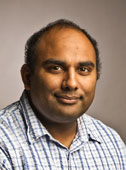New Staff
MUSIC, FENCING AND SURGICAL SKILLS

Ranil Sonnadara
|
Ranil Sonnadara joined
the University of Toronto
Surgical Skills Centre
as a Research Scientist in
September 2008. Originally
from England, Ranil brings
a diverse and atypical skill
set to the Department of
Surgery. In his 'first career',
he was a sound designer
and composer for theatre
and film. Ranil won several
awards for his work which spanned 10 years, 4 continents,
and included residencies at the Royal National
Theatre and West Yorkshire Playhouse, two of England's
"flagship" theatres, and several forays to Toronto, Sydney
and New York. Ranil is also a highly successful fencing
coach; several of his students have been selected
for University, National, World Championship and
Olympic Teams both in the UK and in Canada. A recognised
expert in coaching development, Ranil has been
an integral member of the team responsible for moving
coaching and referee development models for fencing
in Canada from time-based curriculae to a proficiencybased
model of evaluation and training. Ranil is also an
occasional consultant for Sport Canada, and is a member
of the Board of Directors for the Coaching Association
of Canada and the Ontario Fencing Association. |
Ranil has masters degrees in Music and Physiology from
the University of Leeds, where he researched factors
which have an impact on skill performance, and a doctoral
degree in Experimental Psychology from McMaster
University. His thesis work sought to untangle the effects
of listening to sounds and music on brain development,
specifically looking at changes which occur in the brain
as a function of experience. Following his doctoral work,
Ranil completed a postdoctoral fellowship in "Motor
learning and expert performance" with Drs. Tim Lee
and Digby Elliott, extending his masters and doctoral
research to look at motor learning and performance in
athletes and musicians. Ranil's research has won awards
from the Canadian Institutes of Health Research, the
International Conference on Music Perception and
Cognition, and the Society for Psychophysiological
Research, and has been published in a wide variety of
high impact factor journals including Brain Research,
Perception and Psychophysics, Neuroreport and Signal
Processing.
Ranil's most recent research extends his previous work
on skill acquisition, performance and evaluation in
athletes to health professionals. Current projects include
studying how underlying information processing pathways
between the different systems which underpin
surgical performance can be optimized as a function of
training and deliberate practice, cognitive factors which
impact performance, and studying how performance can
more reliably be evaluated and predicted. |